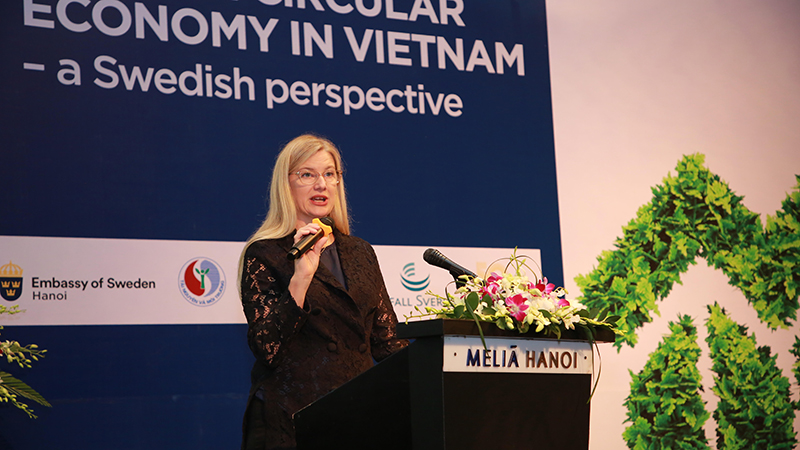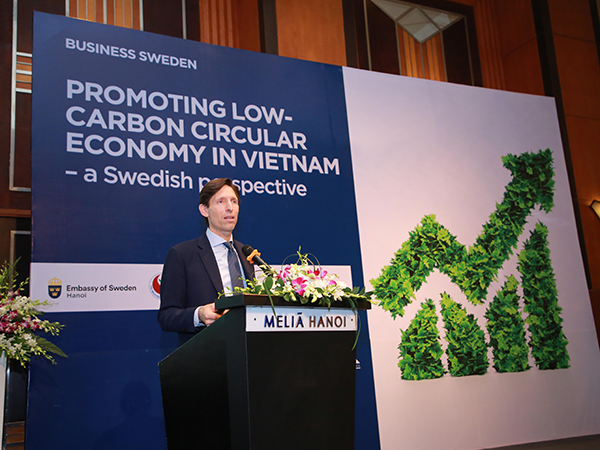Sweden willing to share knowledge of low-carbon circular economy with Vietnam: Amb.
Sweden has made great progress in its ‘recycling revolution’ over the past two decades. The percentage of recycled waste by households in Sweden has increased from 38% in 1975 to 99% today.
Sweden has made great progress in its circular economy and “would happily” share its experiences with Vietnam, Swedish Ambassador to Vietnam Ann Måwe has said.
As one of the most sustainable countries in the world, Sweden is aiming for a zero-waste society. Thanks to the environmental awareness of its citizens, effective policies and incentives by the government and an efficient waste collection system in place, Sweden has made great progress in its ‘recycling revolution’ over the past two decades.
The percentage of recycled waste by households in Sweden has increased from 38% in 1975 to 99% today. Circular economy in a simple way means reduce, reuse and recycle. This also implies changed patterns of consumptions, Ambassador Måwe said when addressing the workshop on “Promoting a low-carbon circular economy - a Swedish perspective” in Hanoi on Tuesday.
| Swedish Ambassador to Vietnam Ann Måwe. Photo: Swedish Embassy |
“In a circular economy, we see everything as a resource for something else – waste becomes a resource. Circular economy is good for both consumers and businesses. Companies that are moving in this direction have proved that recycling used products can be more cost effective than creating them from scratch.
As a result, production costs are reduced, so that the sale price is also lowered, thereby benefiting the consumer. I hope this is inspiring for Vietnamese businesses,” the ambassador added.
The workshop was jointly hosted by the Embassy of Sweden, Ministry of Natural Resources and Environment (MONRE), and the Hanoi People’s Committee.
It drew the participation of representatives from government bodies, NGOs, institutes, universities, organizations and enterprises actively involved in circular economy such as Tetra Pak, Food Industry Asia, PRO Vietnam, Swedish Waste Management Association and Circulate Capital and etc.
The workshop focused on discussions on Vietnam's policies and vision in promoting the circular economy, successful case studies in Sweden and in the region, as well as enterprises’ approach to access capital for implementing this model.
One of the biggest obstacles for Vietnam in applying this model is the management of collection and recycling of waste resources, which is considered as input of the circular economy model. Therefore, the workshop also covered the evaluation of practical waste management in Hanoi, the Swedish waste collection and recycling model, and especially sharing about challenges and opportunities from a Vietnamese recycler’s perspective.
At the workshop, a discussion was held on the theme of public – private partnership establishment, which is a key condition for a low-carbon, circular economy model to be extensively and intensively expanded in Vietnam.
Within the workshop framework, Tetra Pak - the Sweden-based food processing and packaging solution provider shared the company’s journey towards a low-carbon, circular economy through environment protection initiatives. In particular, its key products – carton packages are made from Forest Stewardship Council certified cartons. The company has recently started field testing paper straws for beverage products in Europe, becoming “the first carton packaging company” to launch paper straws in the region.
| Jeffrey Fielkow, Managing Director, Tetra Pak Vietnam. Photo: Swedish Embassy |
“Today, we should not think about global environmental issues such as climate and waste in isolation. We need to look at them together. To achieve this, we must complete the circular economy so it takes into account not just recycling and reuse but also the carbon impact of raw materials and manufacturing. This means looking beyond end-products to address the full impact of our businesses, from sourcing raw materials to recycling used products.
At Tetra Pak, we are working to achieve this by delivering solutions with the lowest carbon footprint and highest efficiency, minimizing the environmental impact on our own operations and working with partners towards circularity for our products,” said Jeffrey Fielkow, Managing Director, Tetra Pak Vietnam.
The workshop took place in the context that rapid growth and industrialization have not been friendly to Vietnam’s environment and natural assets. Waste generation in the country is expected to double in less than 15 years. Vietnam is among the ten countries worldwide that are most affected by air pollution.
Meanwhile, less than 10% of waste in Vietnam is recycled and a significant amount of waste ends up directly at landfills or in the ocean. With 13 million tons of waste released to the ocean each year, Vietnam ranks 17th in the world and 5th in Asia for ocean plastic waste pollution, releasing more than 500,000 tons per year into the ocean.
Sweden, at the other end of the spectrum, is one of the world’s leading countries in waste management and recycling. As a large amount of waste is recycled and used for other purposes such as biogas and energy, Sweden has now turned into a waste importer, importing more than 2.3 million tons of waste per year.
Circular economy is currently a global sustainable trend. The transformation from conventional economy to circular economy enables nations to deal with scarcity of natural resources and environment pollution.













